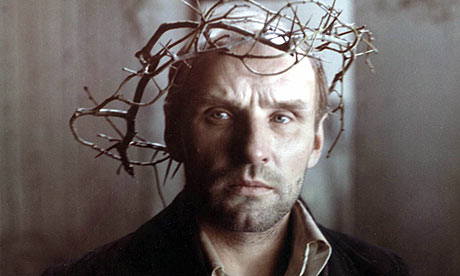The love that loves us.
Infamously known for taking an awful lot of time between projects, Terrence Malick has uncharacteristically weaved a quick follow-up (a little more than a year) to his critical hit "The Tree of Life" in the form of "To the Wonder", a solemn rumination on how love affects the lives of those who search for it. Faster than a bullet train, many have immediately predicted the film's unanimous critical triumph. But sadly, what happened was quite the opposite, as "To the Wonder" finally proved that Terrence Malick, one of the more beloved art film directors today, can also truly divide.
Met with mixed amounts of laughter, applause and boos during its Venice Film Festival premiere, saying that "To the Wonder" is polarizing is quite an understatement. Perhaps some have grown tired of Malick's loose-structured style, while some may have seen through the grave pretense of his themes. As for me, "To the Wonder" proved to be quite a transcendent experience.
To state the fact, it's not, in any way, a 'movie' in the most intrinsic sense of the word. Dominantly, "To the Wonder" is more of a feature-length mood piece. And like a sweeter Alain Resnais, Terrence Malick, through the use of deeply pleading narrations and breathtaking yet fragmented imagery, explores love at its most trying and at its most pure. From a Parisian woman's (Olga Kurylenko) search for the meaning of her romance with an American man, played by Ben Affleck with a sort of detached silence, to a Spanish priest's (Javier Bardem) quest to make one with his spirituality, the film approaches the many forms of love with articulate questions and wandering thoughts that it has delivered through the profound nuances of the French and Spanish language.
By doing so, the film takes on a more personal level. As the film continues on with its various reflections, the film becomes less and less about love in general and more and more like a silently thankful prayer. And just like "The Tree of Life", "To the Wonder" is a highly personal project for Terrence Malick, as he himself, from what I've read, is basically the Ben Affleck character in the film. So in many respects, "To the Wonder's" creation is basically a form of unhindered personal expression. For an artist like him, expressing whatever he feels through written words is certainly not enough.
Like a well-wrought diary entry, "To the Wonder" is Malick's remedy to his various emotional ellipses. And although the film is as ambiguous and baffling as the next artsy fartsy film, its emotional content, as far as I'm concerned, is as coherent as it can be. The film may be branded as an utter piece of pretentious art, but what it cannot be accused of is deluding the audience's emotions. Like a beautiful romantic symphony, "To the Wonder" is a film that you just can't help but stop and hum along with.
Terrence Malick, unlike any directors of any kind out there, treats cinema as his personal poetry book, and I couldn't be more thankful about it. Ultimately, 'thankful' is the key word here. Lyrical, elegiac and also quite life-affirming even despite its perceived ambiguity, "To the Wonder" is a film that speaks more truth about love than some 30 romantic films combined. "To the love that loves us, thank you."
FINAL RATING






